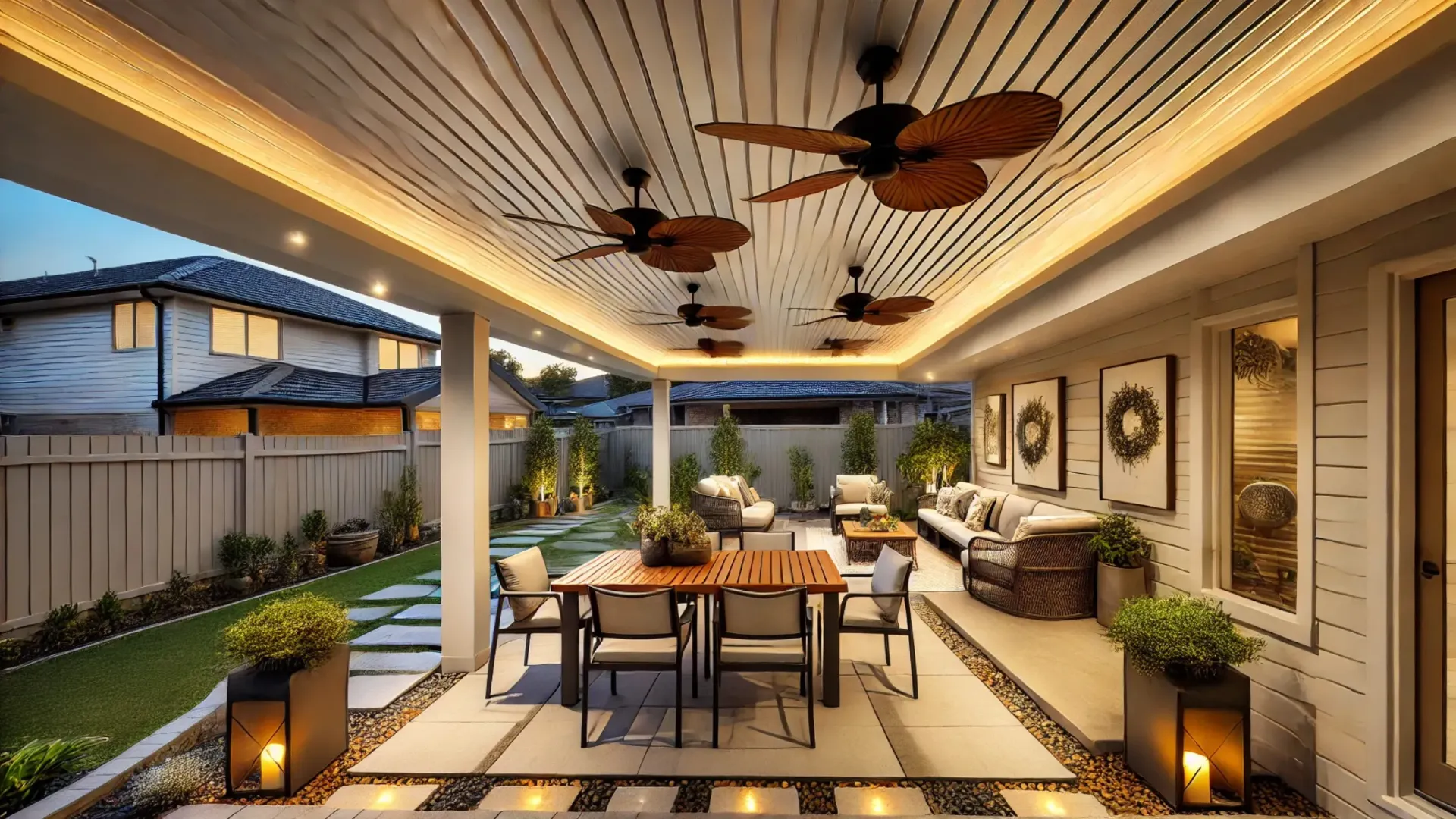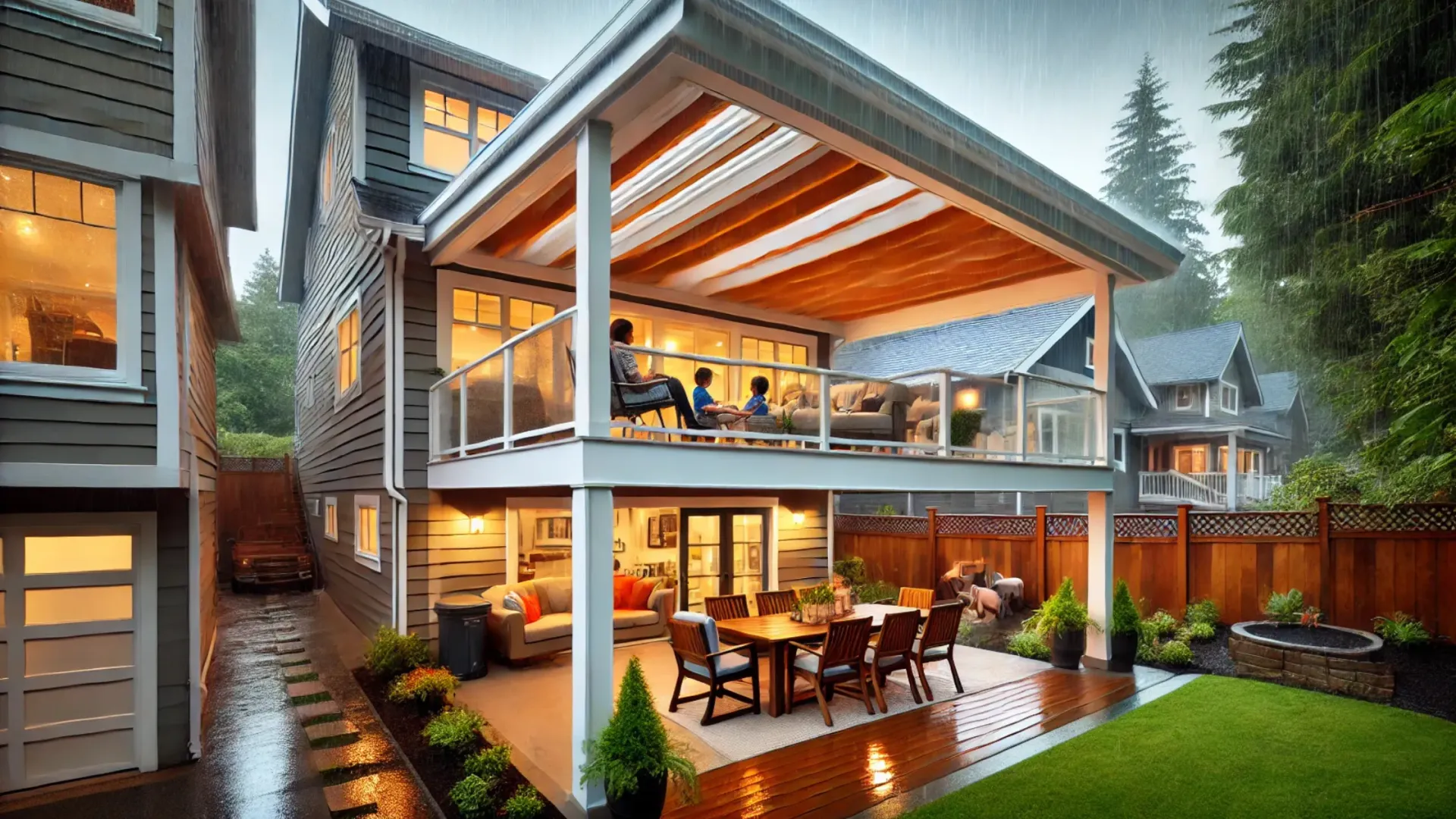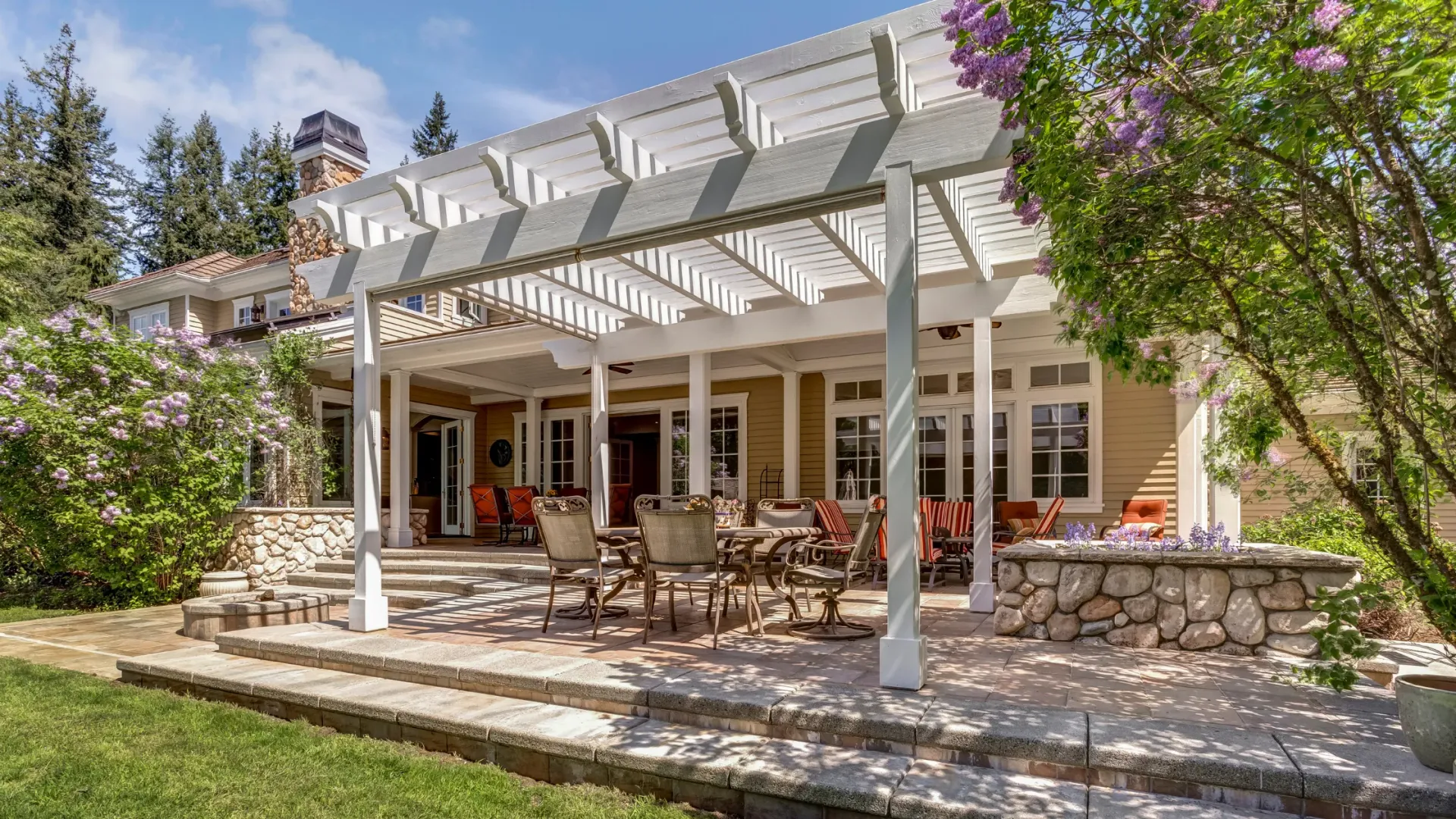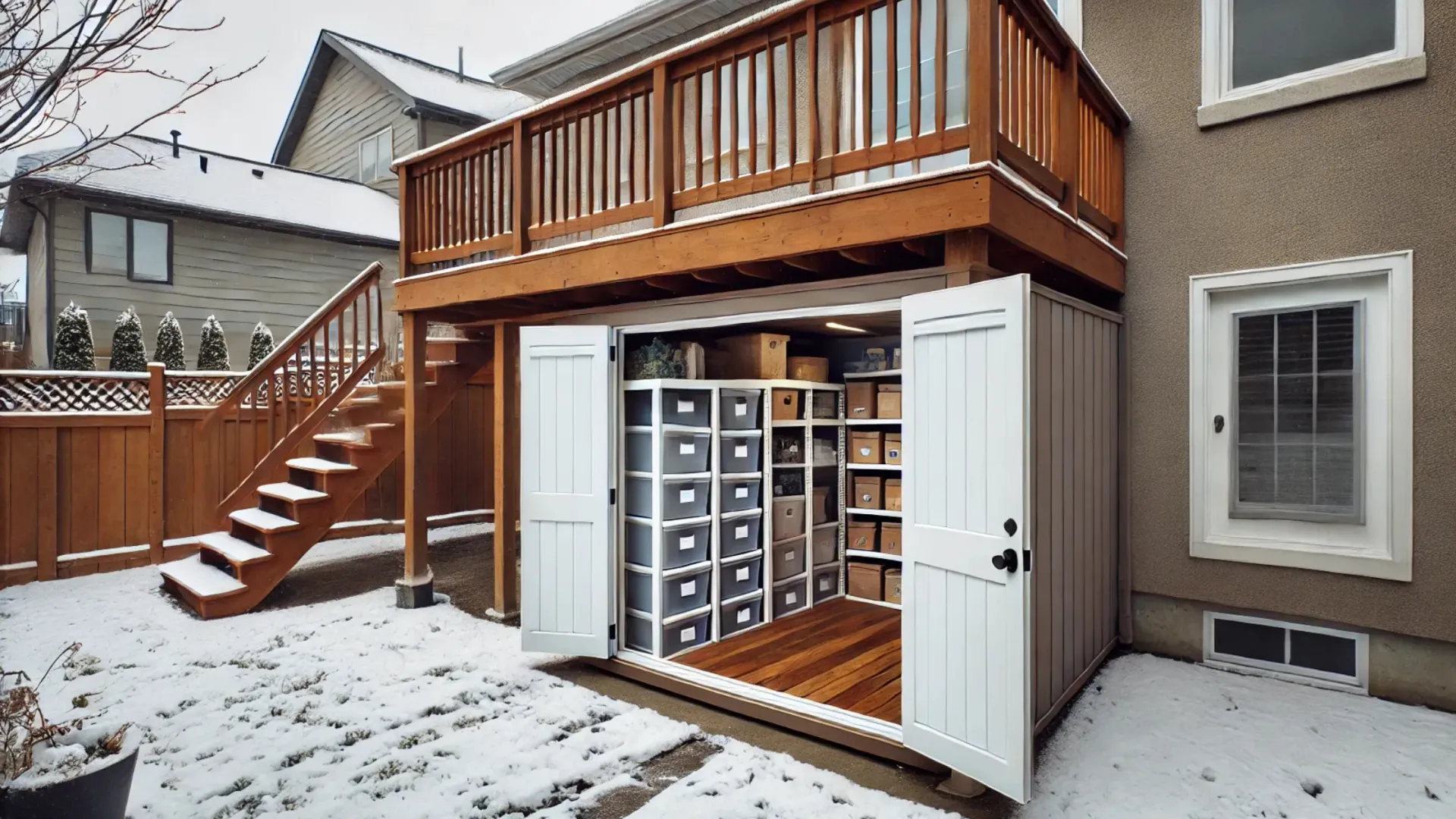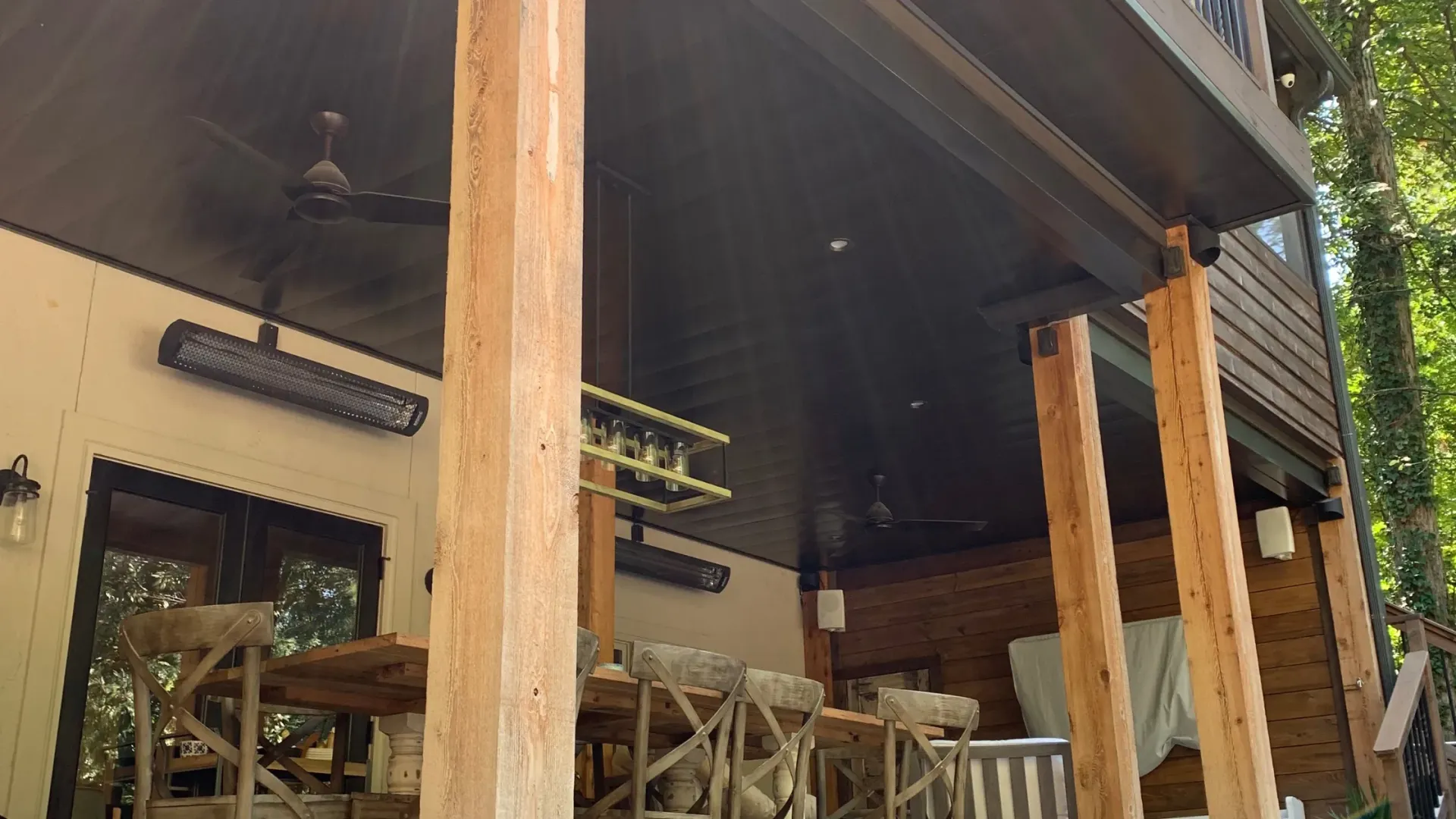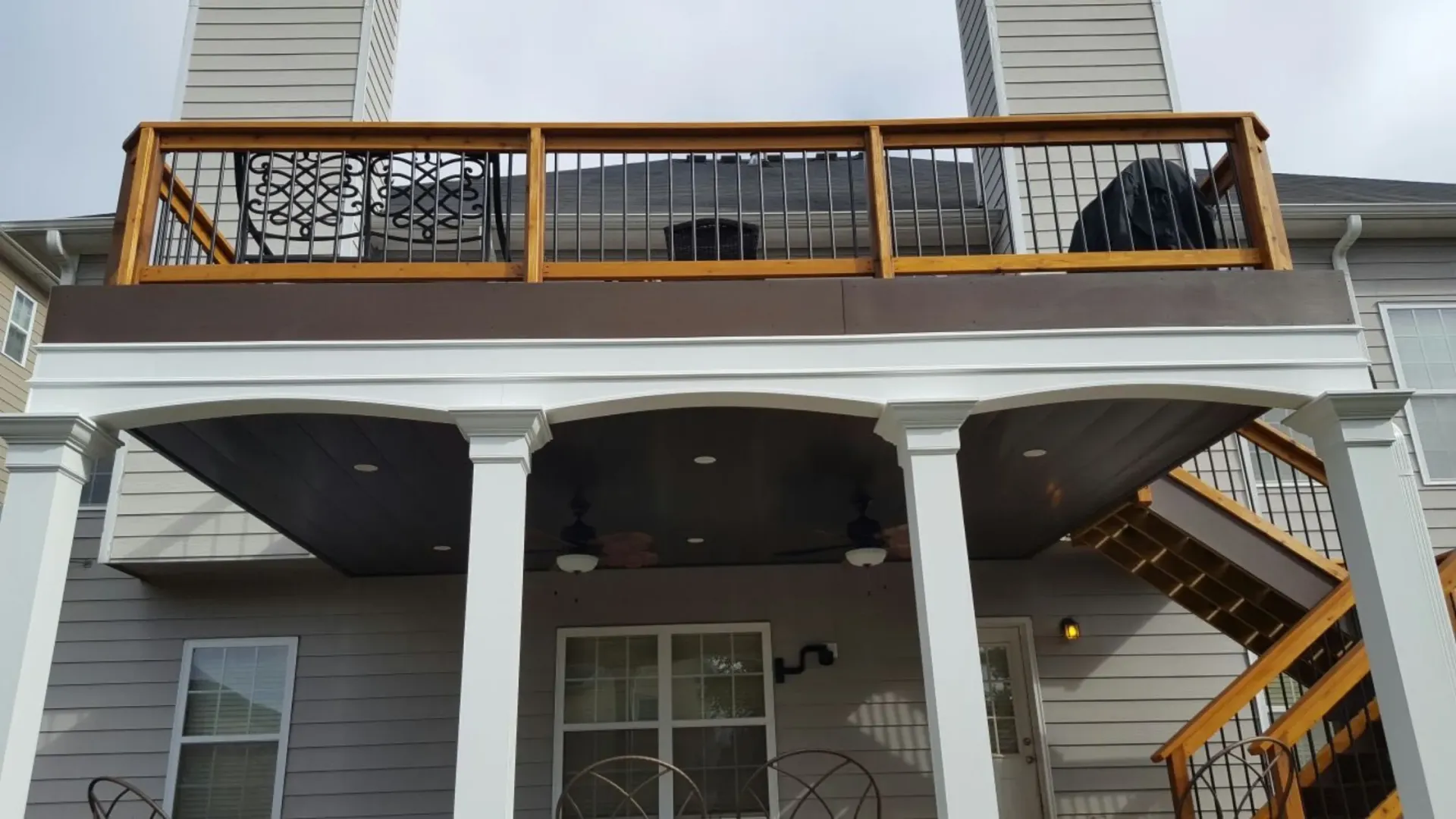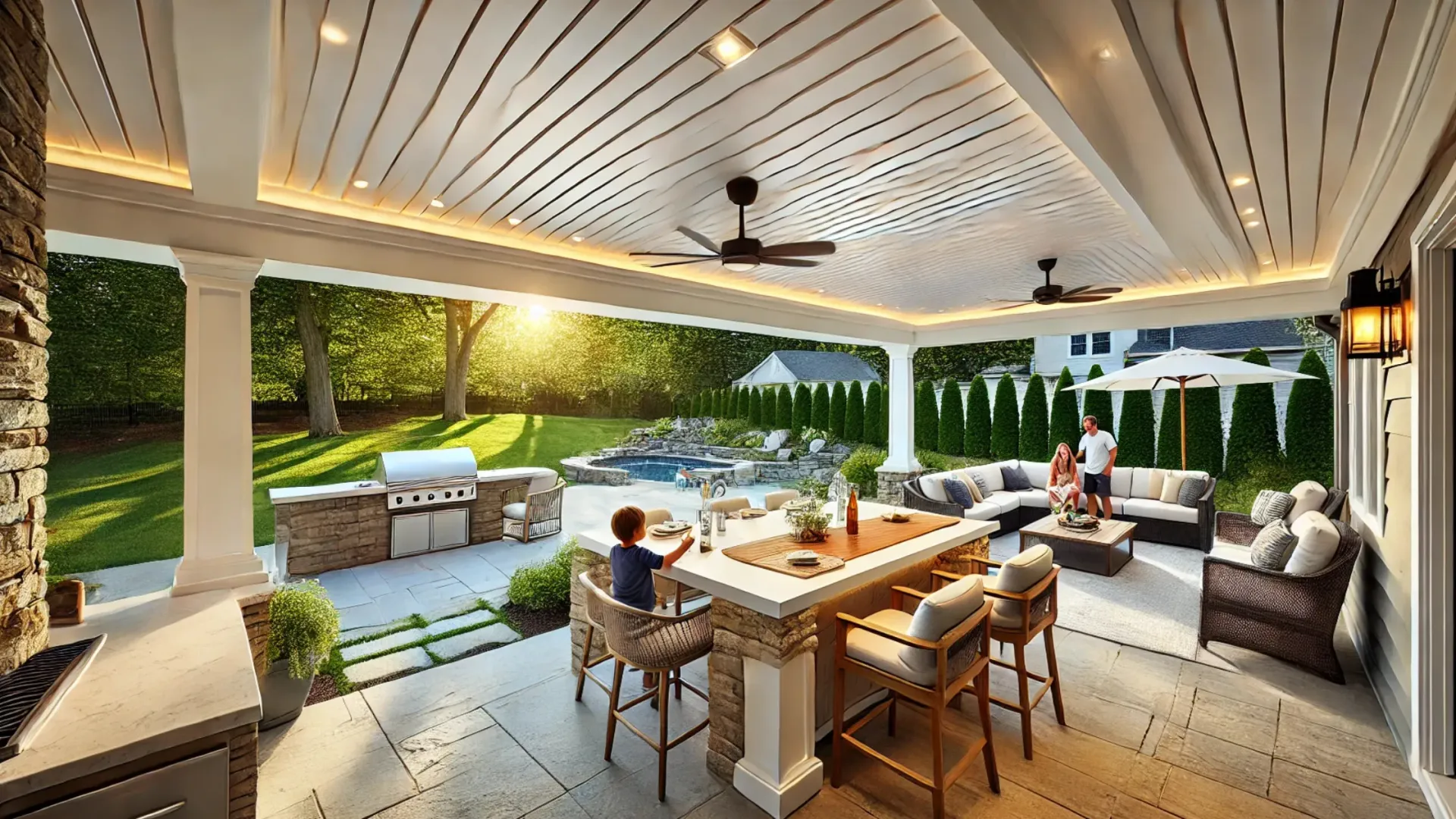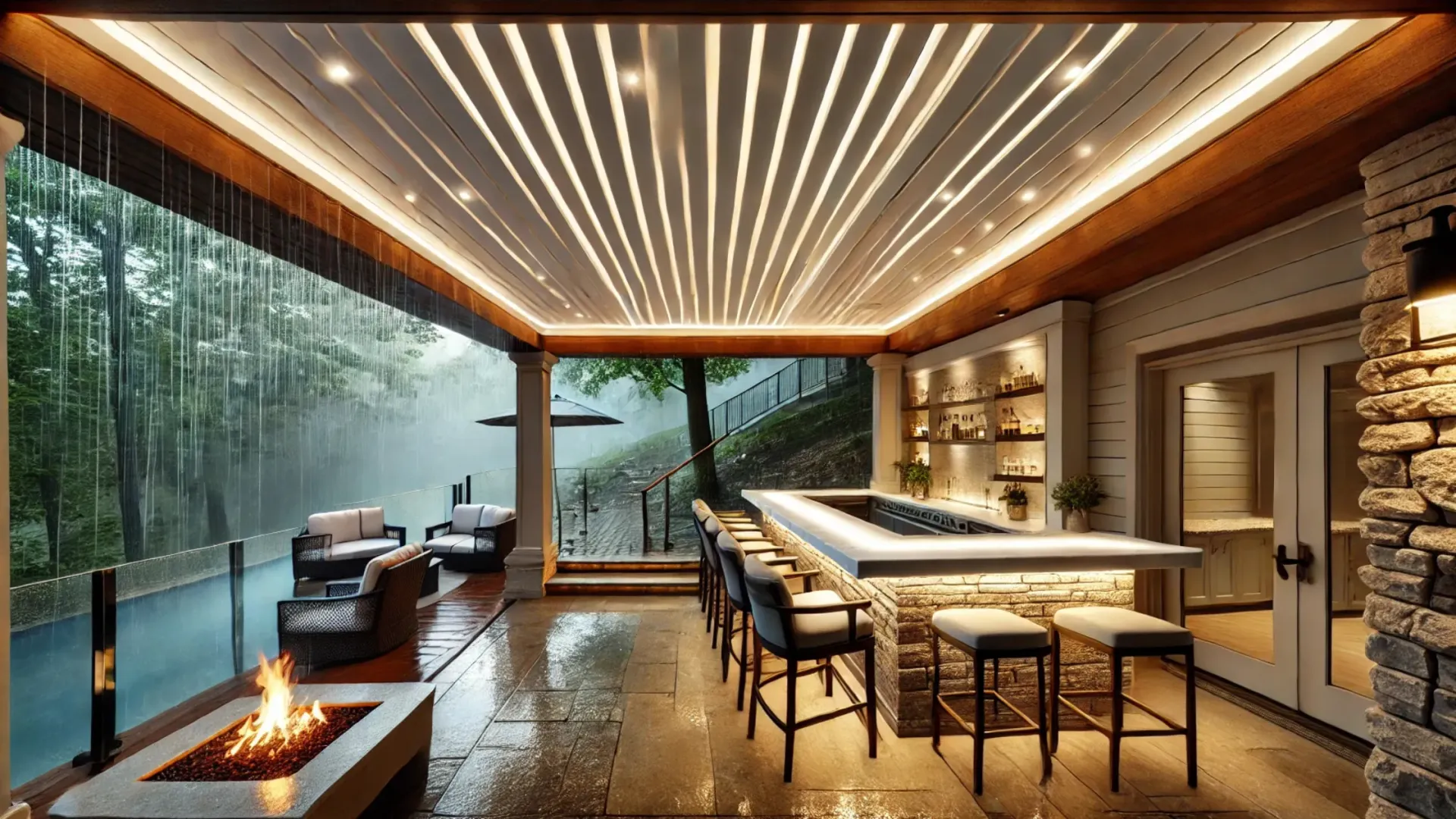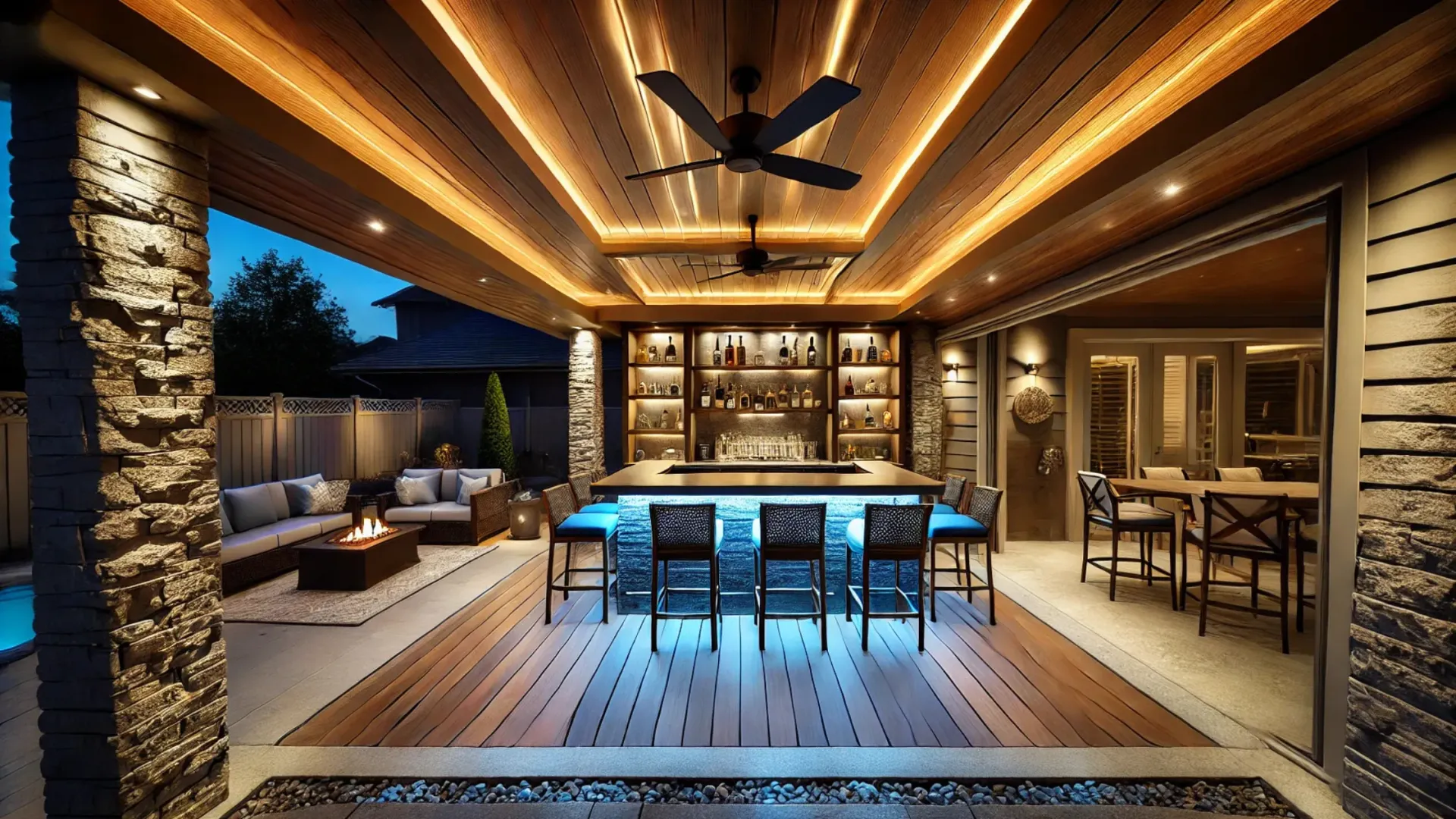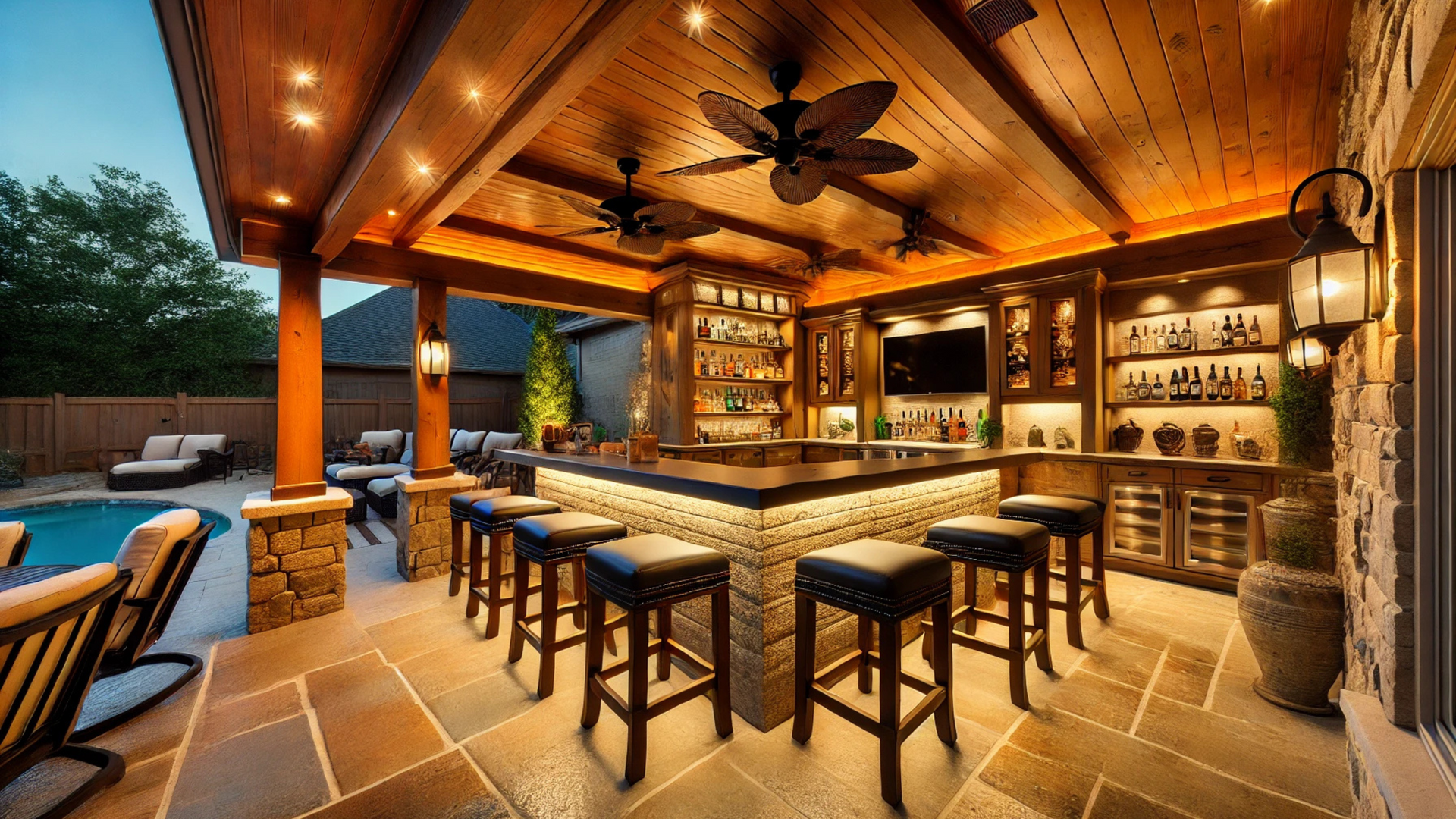How Much Does It Cost To Install Under Deck Ceiling?
Elevated decks offer numerous possibilities beneath them. To spark your creativity, explore our inspiration gallery and consider installing a deck drainage system.
The first step in any under-deck project is ensuring the space is waterproof. With a top-notch drainage system like Maxi Decks Protection's, you can transform this area into a home office, a cozy sunroom, or additional storage.
If you need extra storage, you're all set. However, for a livable space, an under-deck ceiling is necessary. Let's explore various styles and their associated costs, turning your weekend into a rewarding home improvement venture.
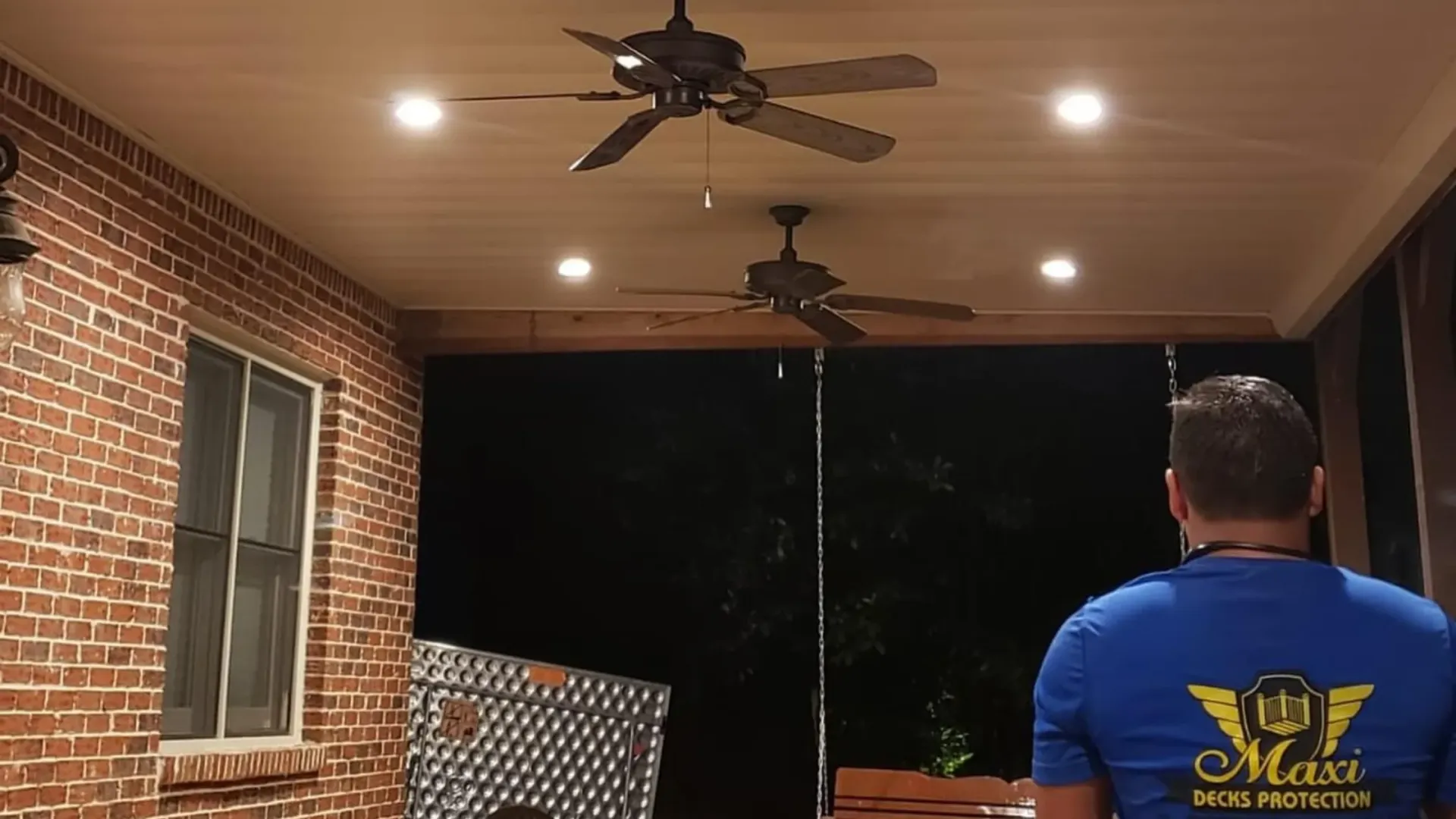
Discover the True Cost of an Under Deck Ceiling
When planning an underdeck ceiling installation, several factors influence the total cost, including materials, lighting, and the size of the space. Whether you hire a contractor or tackle the project yourself also plays a significant role. Labor costs can fluctuate depending on your location, so it’s important to research local rates.
Opting for a DIY approach can save you around 25% on expenses. For instance, while hiring a professional might cost approximately $2,436 for installing a 14×20 foot under deck ceiling, doing it yourself could reduce the expense to about $1,750.
Investing the saved money into premium materials can elevate the overall quality of your project. For example, deck drainage systems cost between $6.00 and $8.00 per square foot.
To complete the installation, you'll need a few essential tools; if you don’t already own them, consider adding these items to your budget:
- Ladder
- Circular saw
- Cordless drill
- Drill bit set
- Safety glasses
Pre-fabricated ceiling systems are available and may require custom fitting to your space. If you aim to enclose the area entirely—perhaps for a pool house—you might explore options like zip-up underdeck systems or vinyl and aluminum panels for a more streamlined finish.
By weighing these considerations, you can make informed decisions about your underdeck ceiling project, ensuring that it aligns with your preferences and budget.
Explore Your Underdeck Ceiling Options!
When selecting materials for an underdeck ceiling, there are several options available. Many homeowners opt for aluminum or vinyl/PVC due to their affordability and ease of installation. Here’s a brief overview to help you decide.
| Feature | Aluminum | Vinyl |
|---|---|---|
| Durability | Superior durability that will not rot, chip, crack, or rust | Highly durable - will not rot or corrode over time |
| Maintenance | Very low maintenance | Easy to clean and maintain |
| Repainting | No repainting required | May require repainting over time |
| Insects | Resistant to insects | Can be susceptible to insect damage |
| Ventilation | Highest ventilation efficiency of any product | Lower ventilation efficiency |
| Cost | Typically more expensive | Less expensive than most other options |
| Versatility | Limited color and texture options | Very versatile - lots of choices in colors and textures |
| Flexibility | Highly flexible and less rigid than vinyl | Less flexible and more rigid than aluminum, but still offers some degree of flexibility compared to other materials. |
| Water Resistance | Water and fire-resistant | Water repellent |
| Weather Resistance | Can withstand most weather conditions | Can withstand most weather conditions |
When deciding on a ceiling finish, your color and texture preferences play a crucial role. Some people love the classic appeal of beadboard ceilings, while others opt for a sleek, smooth surface.
While these two options are popular choices for self-installation, there are other alternatives worth exploring. Each comes with its own unique set of benefits and challenges. If you're curious about additional options beyond the commonly chosen ones, we've got an excellent guide to help you assess what's available.
Most Popular Materials for Your Under Deck Ceiling!
When discussing under deck ceiling systems, often called soffits, aluminum and vinyl are popular materials due to their affordability and ease of installation. Aluminum stands out for its durability—it resists chipping, cracking, rusting, and warping, making it a reliable choice. In contrast, vinyl is thinner and prone to sagging over time due to weight and is also more susceptible to weather elements like rain and snow. Temperature changes can cause vinyl panels to warp and fade.
Additionally, vinyl systems are not waterproof, which makes them unsuitable if you plan to install electrical fixtures or use the space during rainy conditions. Over time, vinyl requires frequent maintenance and may need replacement multiple times, making it less cost-effective compared to aluminum.
Aluminum is easy to clean, doesn't need repainting, and offers superior structural integrity. For a robust, low-maintenance solution that protects the area beneath your deck, aluminum is the superior choice.
Discover the Amazing Benefits of an Underdeck Ceiling!
With outdoor living becoming increasingly popular, homeowners are always looking for ways to maximize their usable outdoor space. One innovative solution that’s gaining traction is the underdeck ceiling system. This article will outline the essential benefits of installing an underdeck ceiling, offer practical advice on choosing materials, and provide insights from homeowners who have transformed their outdoor areas.
Protect Your Deck from Weather Damage
The primary purpose of an underdeck ceiling system is to protect the space beneath your deck from harsh weather conditions. By creating a barrier against rain, snow, and ice, these systems prevent water damage and prolong the lifespan of your deck. According to a report by the North American Deck and Railing Association, decks that are adequately protected from weather elements last significantly longer, reducing the need for costly repairs.
Create a Dry Outdoor Space
An underdeck ceiling system turns the area beneath your deck into a dry, usable space. This allows homeowners to use the space for storage, entertainment, or relaxation irrespective of the weather. Imagine having a cozy outdoor nook where you can unwind during a rainstorm or host a barbecue without worrying about sudden showers.
Increase the Value of Your Home
Investing in an underdeck ceiling system can enhance your home’s aesthetic appeal and market value. A well-designed outdoor space is a desirable feature for potential buyers, making your home stand out in a competitive real estate market. Statistics from the National Association of Realtors suggest that outdoor spaces can increase a home's value by over 10%, providing a substantial return on investment.
Compare Underdeck Materials for Durability
Choosing the right material is crucial for the longevity of your underdeck ceiling. Options range from vinyl and aluminum to more premium choices like wood composite. Aluminum is known for its durability and resistance to corrosion, while vinyl offers affordability and ease of maintenance. Each material has its pros and cons, so consider your climate and personal preferences when making a decision.
Installation Tips for Homeowners
Installing an underdeck ceiling system requires careful planning and execution. For DIY enthusiasts, ensure you have the necessary tools and skills before undertaking the project. If you opt for professional installation, research contractors thoroughly and seek recommendations from trusted sources. Remember, a well-installed system will ensure maximum protection and aesthetics.
Maintenance for Longevity
Regular maintenance is vital to keep your underdeck ceiling system in top condition. Clean the ceiling panels periodically to prevent mold and mildew growth. Inspect for any signs of wear or damage, especially after severe weather conditions, and address issues promptly to prevent further deterioration.
Real-Life Testimonies
Many homeowners have successfully enhanced their outdoor spaces with underdeck ceiling systems. Michelle from Atlanta, Georgia shared, "Jose was fantastic to work with and extremely timely and easy to correspond with. We are very happy with our underdecking - especially how it’s now lit at night!"
By considering the insights and tips shared here, homeowners can make a well-informed decision about installing an underdeck ceiling system. Enhance your outdoor living experience, increase your property’s value, and enjoy the protection of a durable underdeck ceiling system. Explore options today and transform your outdoor space into a functional and inviting extension of your home.
Waterproofing Before Installing Under Deck Ceiling
Before considering a ceiling, it’s crucial to install an underdeck drainage system. Keeping your deck's wooden substructure dry is essential, which requires an over-joist drainage solution to protect joists, beams, and posts from moisture exposure.
Some may suggest adding a roof to your deck, but this won’t safeguard the substructure from moisture. Water can still seep through the deck boards, affecting joists and beams and causing damage over time, particularly in humid conditions. This could lead to substantial structural issues within a decade. For a visual understanding, watch this informative video on why a deck drainage system is vital.
Without proper drainage, moisture trapped between decking boards and an overhead covering can impede the installation of electrical utilities like lighting or ceiling fans.
There are several drainage system options to choose from, such as Trex RainEscape, Under Deck, DrySpace, Dek Drain, Zip Up, and TimberTech. These systems work by creating a gutter and downspout system to channel water away from the deck's structure. When choosing a system, consider factors such as cost, installation ease, materials used, and warranty terms.
Implementing an underdeck drainage system opens up numerous possibilities. You can transform the area beneath your deck into a vibrant patio or even extend your living space with an indoor addition, like a sunroom or screened porch. Enhancing your upper deck with a roof or pergola not only increases your home's visual appeal but also elevates your outdoor living experience.
Optimize Your Deck Build with Maxi Decks Protection.
Maxi Decks Protection provides an all-encompassing solution for under-deck ceilings, merging durability, visual appeal, and cutting-edge water drainage systems. Opting for Maxi Decks means you gain from effortless installation, minimized maintenance, and increased longevity. Their pioneering systems guarantee a dry and inviting under-deck space, ideal for relaxation and entertainment.
What’s the Top Choice for Under Deck Ceiling?
Selecting the ideal material for your under-deck ceiling hinges on your unique requirements, budget constraints, and the environmental factors of your area. Each option presents its own set of benefits and obstacles.
Whether your focus is on cost-effectiveness, longevity, or visual appeal, this guide offers valuable insights to assist you in making an enlightened choice. It's advisable to seek advice from professionals for recommendations specifically tailored to your home's individual needs.
Arrange a complimentary under-deck design consultation for expert support. In the end, the perfect under-deck ceiling material will elevate your outdoor living area, delivering both protection and aesthetic charm for many years ahead.
